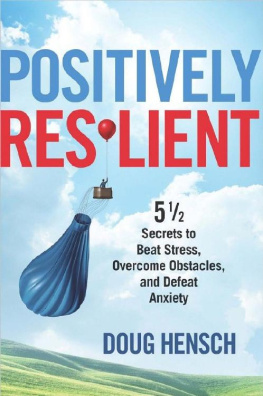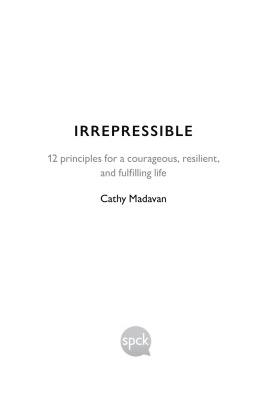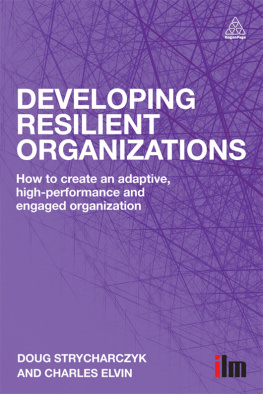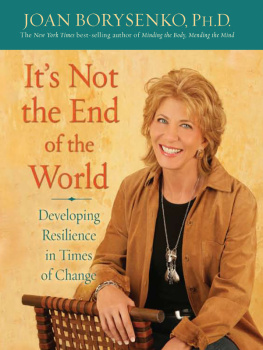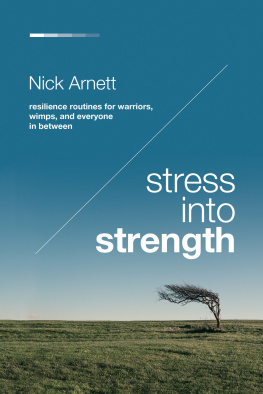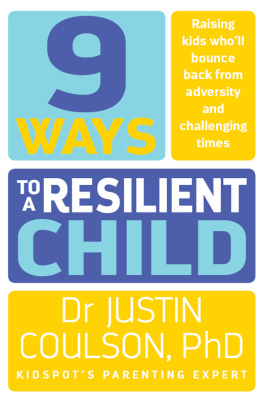All rights reserved under the Pan-American and International Copyright Conventions. This book may not be reproduced, in whole or in part, in any form or by any means electronic or mechanical, including photocopying, recording, or by any information storage and retrieval system now known or hereafter invented, without written permission from the publisher, The Career Press.
To order this title, please call toll-free 1-800-CAREER-1 (NJ and Canada: 201-848-0310) to order using VISA or MasterCard, or for further information on books from Career Press.
The Career Press, Inc.
12 Parish Drive
Wayne, NJ 07470
www.careerpress.com
www.newpagebooks.com
CIP Data Available Upon Request.
To Nick and Zach, the foundation of my resilience and the motivation to learn and grow.
Preface
Do not judge me by my successes; judge me by how many times I fell down and got back up again.
NELSON MANDELA
Several years ago, I spoke with a prominent author about my idea for this book about resilience. My secret plan was to self-publish the book and check it off of my bucket list. However, the author began our conversation by saying, Whatever you do, dont self-publish. She went on to talk about the benefits of having a publisher and I could feel my heart rate increase. The idea of pitching this to publishers scared me.
A short time later, I had coffee with two-time author (and one of the best coaches I know), Anne Loehr. Again, I told Anne about my idea for the book and that I was considering the self-publishing route. Anne also gave me several good reasons to find a publisher. In short, get a good publisher and you produce a higher quality book that can reach more people. My heart rate shot through the roof again.
What was going on? Why was I having this strong physiological reaction to finding a publisher? I spent some time meditating and came to the conclusion that my rationale for pursuing the self-publishing route was simply my way of avoiding rejection. Put another way, it was (in this case) a non-resilient way to address the situation. I realized that my (unrealistic) fear of failure (rejection from publishers) was driving me to possibly write an inferior book.
The lessons in that story are central to this book. Resilience is a foundational quality that can affect our behavior and our psychology in ways that we do not recognize. It is critical to any meaningful relationship and achievement. And you are already resilient. You may not react effectively in certain situations, but if you pause and think about it, you took the action of getting out of bed today, buying this book, and taking the time to read it. I would think it is safe to say that you have effectively handled some very difficult situations in your life. At the same time, we all have room for improvement. A nudge here and a nudge there can result in significant payback for us.
This book is not meant to be the definitive authority on the subject of resilience. There is so much more to be researched and written on the subject. I wrote this because I do not have all the answers and I wanted to share what I have learned from scientists, thought leaders, my executive coaching practice, my experience as a coach of various sports, and being a dad.
Finally, please do not read this with the purpose of alleviating the distress in your life. If you commit to learning and experimenting with some of what is offered on these pages, you just may be more effective in your pursuit of meaningful goals, which end up dragging you to higher levels of happiness and satisfaction with life.
1
The Case for Resilience
Expect adversityexpect more to conquer it.
MARV LEVY, FORMER HEAD COACH OF THE BUFFALO BILLS
I have been writing this book for more than 46 years. Not literally, of course, but from a young age, I have been fascinated by peoples behavior in difficult situations. I have seen my fair share of resilient behavior and examples of people acting not so resilient. I have witnessed this in my own behavior and thought patterns as well. I can vividly remember being 14 years old and screaming at my older sister to get out of the bathroom. (Sorry, Kath.) I also recall being engaged in so much negative thinking before a football game my senior year at the University of Pennsylvania that I threw two interceptions; held the ball too long, which allowed 10 sacks; and I was replaced at the end of the game. It was only our second contest of the year and I returned to the starting lineup the next week, but my season was over. My pessimistic thinking got in the way of several comebacks and ruined my performance. (Sorry, guys.)
Little did I know that a psychology professor was studying optimism and pessimism just a few blocks from our stadium. Dr. Martin Seligman is called the Father of Positive Psychology and he published Learned Optimism: How to Change Your Mind and Your Life during my senior year. Seligmans main thesis was two-fold. First, he argued that being optimistic led to better outcomes in sports, politics,
It didnt end there, as my first job out of college was with a large payroll company as a salesman. Every day, from 9 a.m. to 5 p.m., I made cold calls in person and over the phone. On Tuesday mornings, we had what was referred to as a phone blitz. Our managers gave us lists of companies to cold call and we were on the phones, non-stop, for three hours. It was brutal. People routinely hung up on me. They were rude and some even yelled at me, saying that if I ever called backwell, you get the point.
Every once in a while, I needed a break. If you took too many breaks, your manager would inquire about what was wrong and quietly escort you back to your desk while telling you, Its a numbers game, Doug. You make more sales when you make more calls. Dont take it personally when you get rejected. Then I usually got some encouragement and ignored it completely. After about six months of doing this, I started to look for another job. I had no faith in my ability to sell payroll services and I wanted to quit. In fact, it started to affect my feelings of self-worth and overall confidence as a person.

